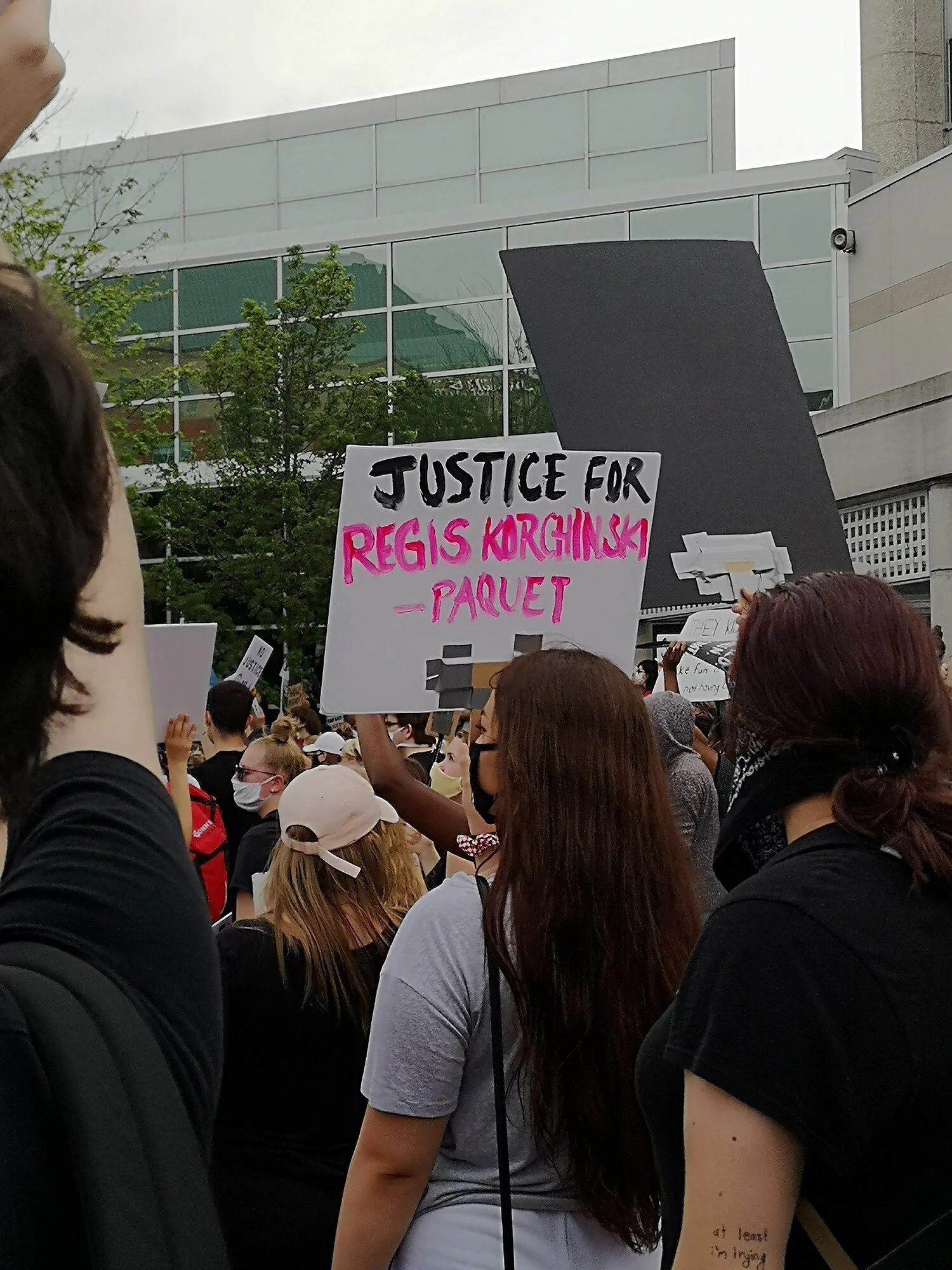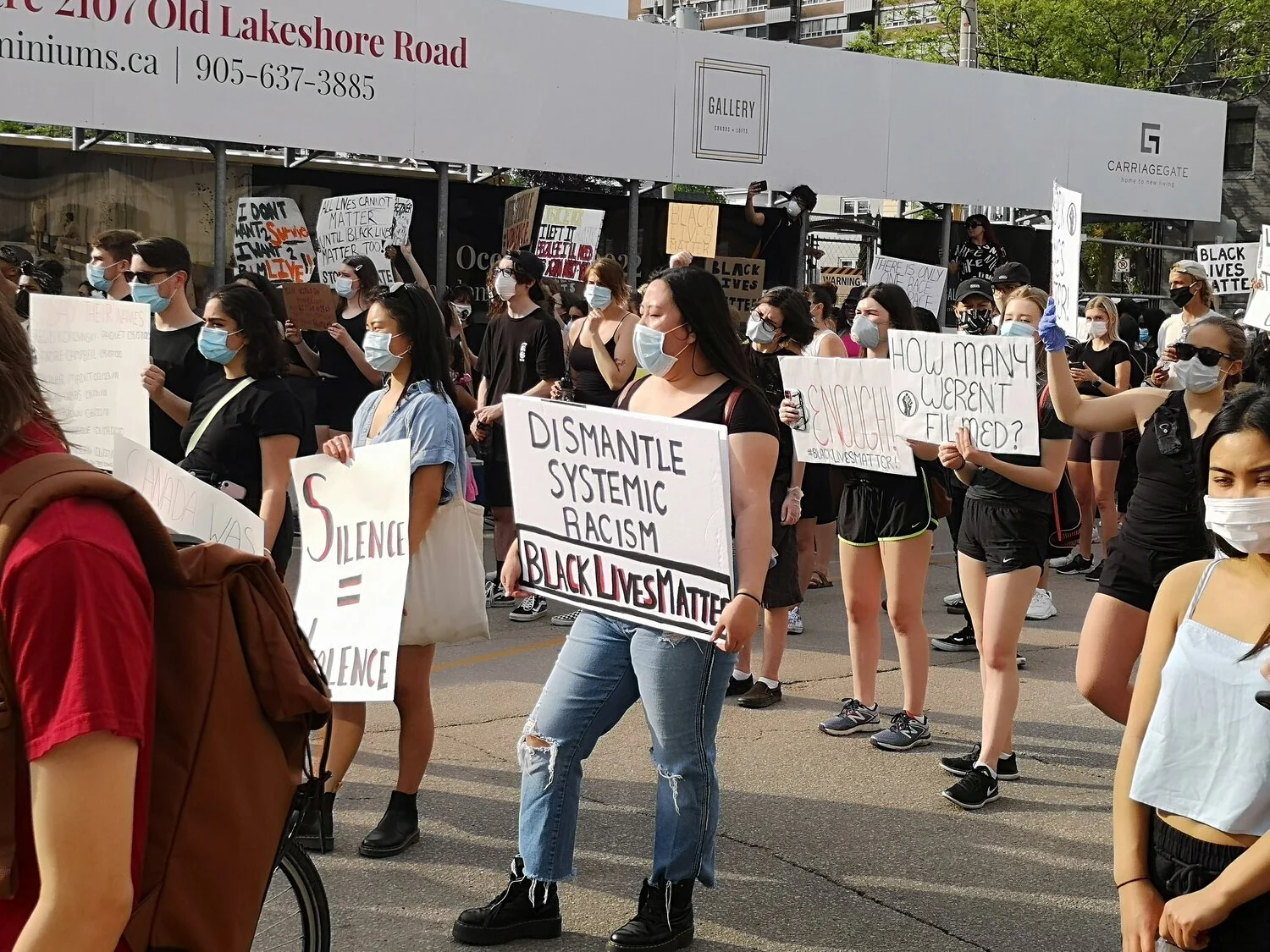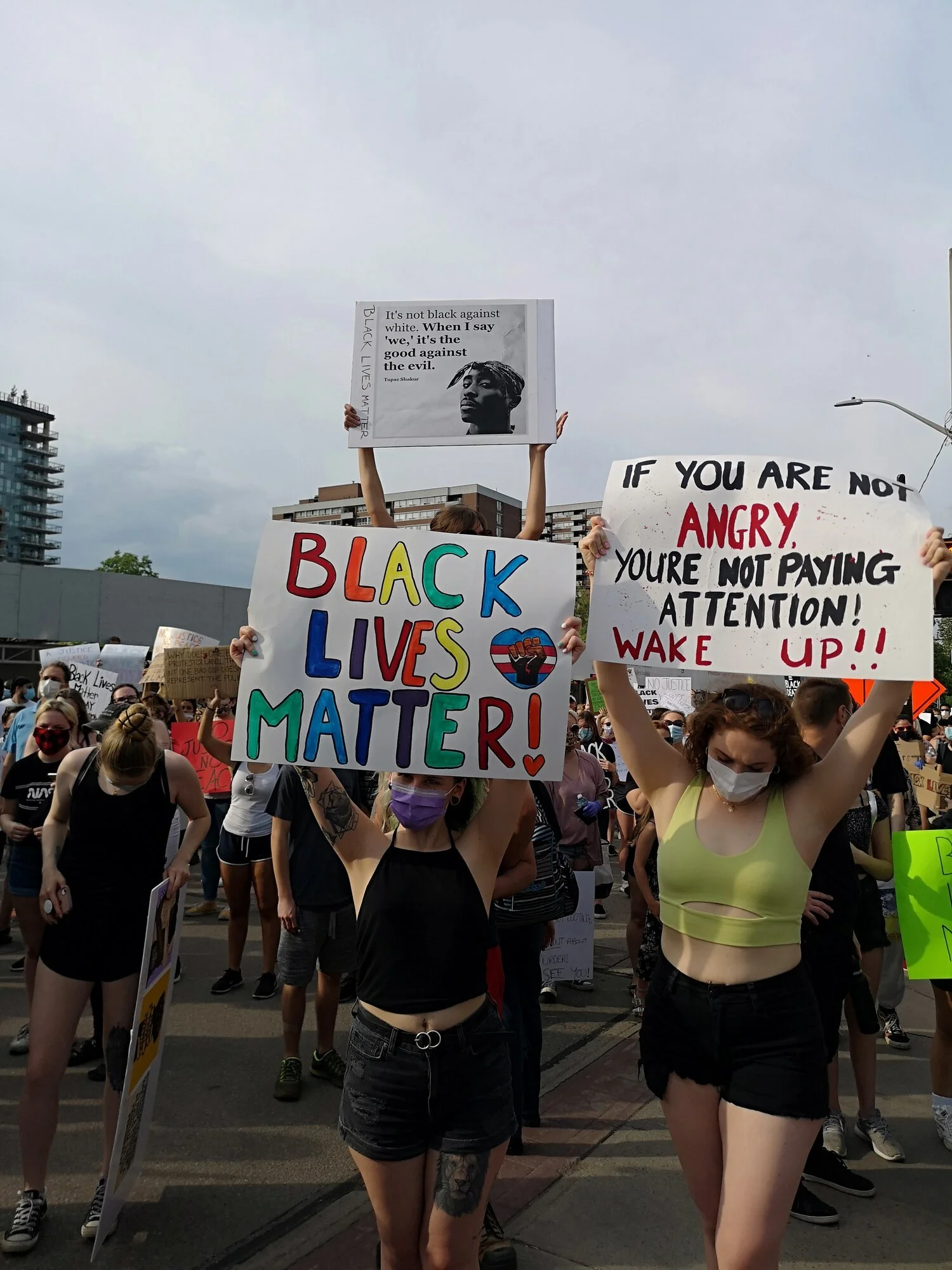Dear White Sisters: Please do not go back to Sleep
Original date: June 8, 2020
What an interesting time to be alive. From the perspective of someone practicing in this space, I am feeling the pain. My heart is breaking and aching for my exhausted Black brothers and sisters. On a positive note, to see this global response taking hold, to see silent players actually using the words Anti-Black Racism and White supremacy. Anti-Racist booklists are popping up everywhere and the one good piece of news I see is that White people are paying for Black and racialized expertise at an unprecedented rate as they wake up from their White supremacy slumber.
This message is for my White sisters. Please, please do not go back to sleep. The racial justice movement needs you now more than ever.
It’s not enough to show up at a protest, post something on #BlackoutTuesday, to share the hashtag #BlackLivesMatter, read Robin DiAngelo’s White Fragility: Why It’s so Hard for White People to talk about Racism and then slip quietly back into the safe and protected rhythm of White privilege. How much more is injustice perpetuated when we expect the oppressed to educate the oppressor?
Can you imagine having to carry the responsibility for educating your abuser or your sexist boss on why what they did was wrong? We need your help.
When I stepped into my own business last year, one of the first things I did was to connect with racial justice thought leaders in this network to ask them about their experiences; what were they excited about in the equity, inclusion, and diversity space? What trends worried them? Who were the unlikely champions in this movement? For this last question, one of the most common responses I received were “White women”. Yes, you. You have an opportunity to use your platform, your privilege, your power, and your influence, to serve in this movement to end Anti-Black Racism and White supremacy.
I’m working with different clients right now and constantly field questions. I welcome them. Dialogue is an important precursor to systems change, in my experience. You can’t change what you can’t name and understand. To support deeper engagement, I’ve offered safe space for conversations which this has led to some meaningful dialogue around what feels like a tipping point in our collective racial justice journey. I wanted to share some of the insights and advice I have offered as a result, and I preface this with deep gratitude to all of the QTBIBOC (Queer, Trans, Black, Indigenous, and Bodies of Culture - thanks, Resmaa Menakem, for this evolution of terms) leaders whose shoulders I stand on and work alongside.
1.Accept your complicity with anti-Black racism, White supremacy, and the maintenance of colonial structures that create systemic racism.
You have a role in this work to dismantle and change these structures and you won’t be able to do the work without making peace with this truth. It’s uncomfortable, deeply saddening, I imagine, and you’ll have to mourn the loss of innocence, the loss of the rose-coloured glasses you’ve had the privilege of wearing for most of your life because of the sheltered and protected existence that White supremacy has afforded you. There is no neutral in this conversation. There is either racist or anti-racist. You’re either doing something to confront, challenge, and dismantle racist structures, or doing nothing (Ibram X. Kendi).
The moment you accept this fact is the moment you begin a lifelong journey of decolonizing yourself, and working to decolonize the spaces you orbit and the cultures you influence. Once you really see racial injustice for what it is, you’ll never be able to unsee it.
2. Commit to Authentic and On-going Self-reflection.
The only place we can start this journey with any degree of authenticity radiating outward is to look at ourselves. Check your privilege. Reflect on your own experience, examine how your privileges, many of which you had no hand in choosing, have directly contributed to the life you live today.
In 2017, Layla Saad wrote a blog post titled “I need to talk to spiritual white women about white supremacy” that went viral. In 2018, she hosted a 28-day free Instagram challenge called #MeAndWhiteSupremacy.
Thousands of people took part in the challenge, which was described as a month-long truth-telling journey for people who hold white privilege to explore their personal complicity in white supremacy. Following the challenge, Saad wrote a workbook which was downloaded by 80,000 people (myself included).
“This workbook [which is now a published book, Me and White Supremacy – 2019], was a first-of-its-kind personal reflection tool for people with white privilege to explore, interrogate, gain clarity on and dismantle their internalized white supremacy.” – Layla Saad
I highly recommend this book as a tool to help you begin to unpack your internalized white supremacy.
Consider the conversations you can facilitate, especially the uncomfortable ones. Use your social capital to challenge the systems around you that are not diverse, inclusive and equitable. If this young woman can do it, then what excuse do any of us have not to? Remember, your success, your privilege, and your comfort comes on the backs of Black, Indigenous and Racialized people.
Resmaa Menakem, a Healer, Therapist, and is the Author of My Grandmother’s Hands: Racialized Trauma and the Pathway to Mending our Hearts and Bodies. This book is probably one of the most influential books in my practice, and I continue to reflect and revisit key ideas and practices.
Menakem addresses the issue of white supremacy in America and the trauma it inflicts on African Americans (“the Black body”), Americans of European descent (“the white body”); and “police bodies,” which stands for the bodies of law enforcement professionals regardless of their color.
“All of this suggests that one of the best things each of us can do—not only for ourselves, but also for our children and grandchildren—is to metabolize our pain and heal our trauma. When we heal and make more room for growth in our nervous systems, we have a better chance of spreading our emotional health to our descendants, via healthy DNA expression. In contrast, when we don’t address our trauma, we may pass it on to future generations, along with some of our fear, constriction, and dirty pain.” - Resmaa Menakem
Menakem also talks about the opportunity all of us have to shift the cultures and communities we are a part of. Whether it’s facilitating a book club, talking with your church groups, your ski club group, whatever the space, consider where you can start having these conversations together.
3. Work to Understand the Injustice.
This is a call for plain earnest, empathic, and human heart-opening. Just because you can’t understand why people are angry, rioting, protesting, and unleashing destruction, don’t assume there isn’t validity to the cause and perspective.
You don’t get to decide the level of trauma and pain an action causes someone who is on the receiving end of racism and oppression. Only the person on the receiving end gets to make this decision. How would you feel if you were beaten by someone and were completely traumatized by the experience, and your friends decided that “it wasn’t that bad”? Invalidation is a betrayal and re-traumatizing experience so please stop doing it.
My fellow consultant, EDI expert and friend, Christina Sackeyfio, talks about empathy as a secret sauce in a recent webinar. Empathy plays a critical role in helping us to relate across differences and to build diverse social connections.
One of the questions I have responded to in recent days includes:
“Why are people claiming that police murdered Regis Korchinski-Paquet that just doesn’t make sense. Why would the police push a woman over a balcony?”
This first sentence below was my response and I’m elaborating here for emphasis.
Why would a police officer put his knee on a Black man’s neck for almost NINE minutes until the Black man dies (George Floyd)?
Why would a police officer shoot a 12-year-old unarmed Black child (Tamir Rice)?
Why would an off-duty officer beat a young and unarmed black man so brutally that he loses his eye (Dafonte Miller)?
Why did police kill a Black man, father of five, living with post-traumatic stress disorder (Andrew Loku)?
Check out Raheem.org, a newly created U.S.-based independent service for reporting police conduct. Brandon D. Anderson founded Raheem after he lost his life partner to police violence during a routine traffic stop. The officer had a history of being physically abusive, particularly during traffic stops, but no one had ever reported him. Getting killed by police is the sixth leading cause of death for young Black men in America.
And for Canadians too (not just Americans) this list goes on and on and on.
We don’t need to hear that you don’t see the injustice. If you don’t see it, own your ignorance. Assume that there’s something you’re not seeing or not understanding, and keep doing your work. Google is your friend. Use it to search words you’ve seen here that may be new or hard to embrace. Explore the resources and leaders that have been referenced here and continue to do your own research.
In this moment, your need to share your feelings cannot be greater than the expressions of pain and trauma of a community that has been experiencing racial injustice for centuries. Pain and trauma are highly activated, if there was ever a time to de-centre yourself, check in on your Black family members and friends, listen to and learn from Black narratives and experience, now is that time.
4. Actively work to de-centre yourself and do not self-appoint the title of “Ally”.
When I say de-centre, I am not referring to the spiritual practice of being centred. I am referring to the way that people with power and privilege move in a way they assume that the world revolves around them, their experience, their needs, their comfort, their priorities, their culture, and their way of life.
Adopt a posture of deference, which means you’re moving in a way that respects and values the expertise and lived experience of the Black people. This posture defers whatever you think you may know in favour of the wisdom, narratives, and diverse experiences in Black communities. This piece of wisdom comes from Kike Ojo Thompson.
While I have always appreciated that allyship is a verb, and that it needs to look like action, definitive, and concrete action, not sometimes, not only when it’s convenient, but consistent and reliable action that you can be counted on to take in the face of oppression, Desmond Cole, Black Canadian journalist, social justice leader, and author of The Skin We’re In, has deepened my understanding from a recent episode of the Warrior Life podcast where he was interviewed by Pam Palmater:
"We should temporarily retire this word #ally, because whatever value it had before has been destroyed by Whiteness centring itself, as it always find a way to do. You don't get to call yourself an ally to my struggle and my oppression. I say this person helps me, they are my ally.
You don't get to come around and centring yourself in my struggle and give yourself a boy scout badge and a cookie because you consider yourself my ally. Stop focusing on titles and do what you know to be right in this struggle, don't make words the centre of this struggle...." - Desmond Cole
Allyship is something to be earned. To be earned when Black, Indigenous, racialized communities, marginalized communities acknowledge your support in their struggle. If your work does not include close dialogue, collaboration and conversation with the communities you are working to support or “liberate”, then it’s not allyship.
If you’re doing your work in the right way, outrage should be part of the emotions you experience. Let that outrage fuel you to have the conversations we need you to have, and to challenge the spaces you have the power to challenge. You do have the power to dismantle the systems that are keeping anti-Black racism alive. To disrupt the power and privilege that sustains colonialism and white supremacy. And to decolonize yourself and your community. The global cooperative response to COVID-19 proves it. It proves that when we come together and work together, we can facilitate the changes needed so that when our grandchildren ask us what we did to help in this time, we can tell them that they come from a family that stood up, that cared enough to help change the course of history for a more inclusive and equitable future.
And please, put away the pillow.
“Engage in the long, faithful work of awakening with your heart and mind, open to the possibility that things are more complex than they once seemed. “- Morgan Harper Nichols



